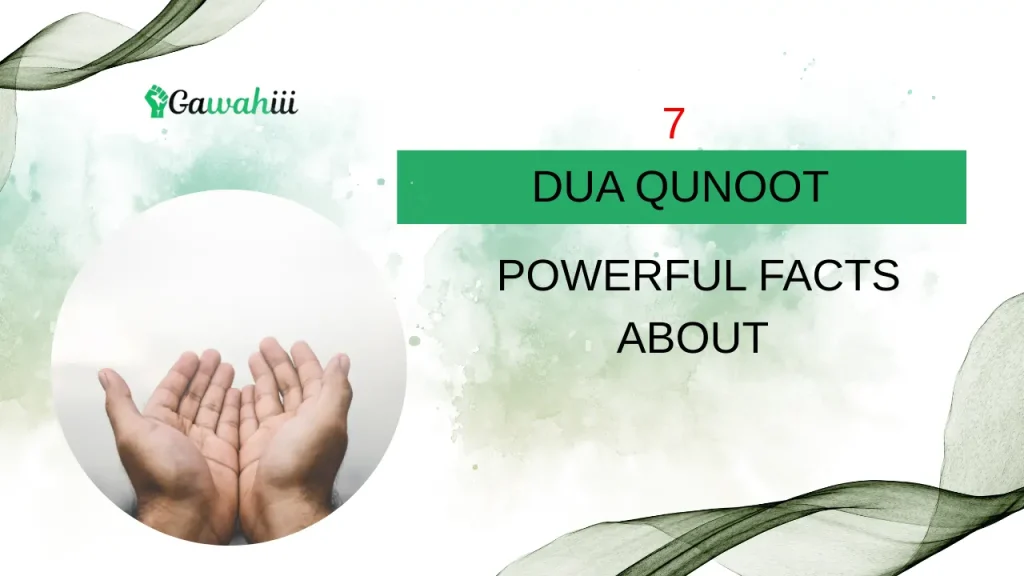Introduction
Dua qunoot Since our world is full of distractions and our spiritual lives can be fleeting, it is especially important to return to real prayers. One important and beloved prayer in Islam is the Dua Qunoot. This specific dua is said during Witr prayer and expresses humility, hope, and faith in God.
Many Muslims try to feel more connected to their prayers when they feel sensitive or at a crossroads. Making Dua Qunoot gives us the chance to ask the Lord for His mercy, guidance, and protection. This article will explain everything you need to know about saying and remembering Dua Qunoot. You will be taught what it stands for, where it began, its many forms, and ways to use it in your everyday worship routine.
Let us take up this effort and appreciate Dua Qunoot and make our prayers of a higher spiritual level.
What is Dua Qunoot?
Dua Qunoot is a prayer that takes place during the last rak’ah of Witr prayer. Obedience, humility, and devotion are the main meanings given to the word “Qunoot” in language. The word Qanata, which means to stand firmly in devotion, is where it gets its name.
Key Features:
- It is most often read in the Witr prayer after bowing, but there are also traditions to say it before.
- It is described in the Hadith and followed by the Prophet Muhammad (peace be upon him).
- Dua Qunoot can also be prayed when something bad happens (Qunoot Nazilah).
Semantically Related Terms:
- Witr prayer
- Sunnah supplications
- Qunoot
- Invocation during calamities
Purpose and Intent:
- Seeking divine mercy and guidance
- Pray to God for protection from error, wrongdoing, and adversity.
- Being humble before the guidance of Allah
Origin and Historical Context of Dua Qunoot
Learning about Dua Qunoot makes its practice more meaningful. It is based on the Prophet’s actions and was part of his night prayers.
Historical Highlights:
- He recited Dua Qunoot during Witr prayers and also in tough times (known as Qunoot Nazilah).
- People recited it when they wanted help in war or when disasters took place.
- Companions received specific variations based on the situations they faced.
Hadith References:
- As reported by Al-Hassan bin Ali (RA), the Prophet instructed him on the words to be said in Qunoot.
- They are included in genuine collections of Hadith, including Abu Dawud, Tirmidhi, and Ahmad.
Why It Matters Today:
- Shows how the Prophet prayed and how his example is still relevant today.
- Motivates Muslims to go to Allah during hard times.
The Text and Translation of Dua Qunoot
Being familiar with the words and what they mean in the prayer improves your focus and helps you get closer emotionally and spiritually.
Arabic Text:
اللَّهُمَّ اهْدِنِي فِيمَنْ هَدَيْتَ، وَعَافِنِي فِيمَنْ عَافَيْتَ، وَتَوَلَّنِي فِيمَنْ تَوَلَّيْتَ، وَبَارِكْ لِي فِيمَا أَعْطَيْتَ، وَقِنِي شَرَّ مَا قَضَيْتَ، فَإِنَّكَ تَقْضِي وَلَا يُقْضَى عَلَيْكَ، وَإِنَّهُ لَا يَذِلُّ مَنْ وَالَيْتَ، وَلَا يَعِزُّ مَنْ عَادَيْتَ، تَبَارَكْتَ رَبَّنَا وَتَعَالَيْتَ
English Translation:
- Lead me among those who have been guided by You, O Allah.
- Allow me to live as someone who has been given good health.
- Protect me as You have protected others.
- Bless me in what You have given
- Spare me from the fate You have chosen for me.
- Angels are your servants, and none can rule them as you do..……
- He does not feel shame when you have shown kindness to him.
- May our Lord be blessed and lifted in honor.
Tips for Memorization:
- Break into phrases
- Repeat during quiet times
- Use audio guides for pronunciation
When and How to Recite Dua Qunoot
There is flexibility in how Dua Qunoot is read, and it is important to learn the proper time and method for doing it correctly.
Witr Prayer Context:
- Recited during the final rak’ah
- Ruku is followed by Tahiyyat (reciting the dua and bowing down).
- In some traditions, it comes before engaging in Irukandji. u.u…
Occasions for Qunoot Nazilah:
- During public calamities
- Natural disasters
- Times of war or oppression
Step-by-Step Guide:
- Follow the ruku with standing in the final rak’ah.
- Hold your hands high at the level of your chest.
- Pray, leaders should recite the Dua aloud (when praying in a group).
- If you are not silent, recite Ameen after saying every sentence.
The Spiritual Benefits of Dua Qunoot
Along with its ritual purpose, Dua Qunoot strengthens spiritual ties with Allah and helps purify and rely on a person.
Key Benefits:
- Ensures that people rely more on the guidance and decisions decreed by the divine force
- Encourages repentance and humility
- It acts as a protector against the challenges in life.
- Strengthens emotional resilience
Example Scenarios:
- If you experience personal challenges, such as when you are sick or have lost something
- During social or communal difficulties
- Turning to others for help when big choices need to be made
Spiritual Reflection:
- Ruminating on the meanings gives us a clearer focus.
- Develops a sense of love for God’s will
Dua Qunoot in Different Islamic Schools of Thought
While the main aspect of Dua Qunoot is kept, minor changes can be seen in its phrasing and layout in various Islamic laws.
| School of Thought | Position in Prayer | Wordings Used | Frequency |
|---|---|---|---|
| Hanafi | After Ruku in Witr | Commonly known text | Daily in Witr |
| Shafi’i | Before Ruku | Slight variation in wording | Throughout the year |
| Hanbali | After Ruku | Similar to Hanafi | Mainly in Ramadan |
| Maliki | Rarely used in Witr | Emphasis during calamities | Occasionally |
Key Takeaways:
- Real differences rooted in actual narrations
- It is better to stick with just one way of translating, g.g.……
- All rooted in prophetic practice.
Common Mistakes and How to Avoid Them
Dua Qunoot should be performed correctly, without making the typical errors that reduce its goodness or conflict with Sunnah.
Typical Mistakes:
- Incorrect pronunciation
- Choosing to pray at the wrong moment
- Rushing through without understanding
- Overemphasizing volume in the congregation
Solutions:
- Apply audio support to help you say the words correctly. y……
- Either follow the prayer leader or consult the rules of fiqh.
- Understand the expression to feel moved as yorecite..e..e..
- Maintain a balanced tone…
Pro Tips:
- Practice during non-obligatory prayers.
- Ask knowledgeable persons for correction.
Incorporating Dua Qunoot in Daily Life
Although usually recited during Witr, the spirit behind Dua Qunoot can be useful to us in daily life as well.
Practical Tips:
- Think about its significance when you are anxious..…
- Include personal duas, not only formal prayers, in your talks with Allah.
- Teach children gradually.
Personal Reflection:
- Before and after each set of recitations, write down what you experienced.
- Help others learn from what you experienced.
Benefits Beyond Ritual:
- Builds emotional intelligence
- Deepens daily mindfulness
Resources to Learn and Perfect Dua Qunoot
When you use correct and meaningful tools, your recitation will reflect the purpose and meaning behind the acts.
Recommended Resources:
- Muslims often rely on mobile applications such as Muslim Pro or Athan.
- YouTube tutorials from verified scholars
- Books and PDFs offered by Islamic publishing houses
Learning Strategies:
- Use repetition and review.
- Pair listening with reading..…
- Join group studies or halaqas.
Trusted External Sources:
Local imams and teachers
Dua Qunoot for Special Occasions and Calamities
At the time of distress, large or small, Qunoot Nazilah opens up a strong way for everyone to pray in unison.
When to Use:
- Wars, pandemics, and natural disasters
- Personal or family hardship
- During community distress
Structure of Qunoot Nazilah:
- May be longer or customized
- Usually makes special requests for recognition and justice..
Real-World Examples:
- Imams worldwide reciting Qunoot during COVID-19
-
Communities invoking Qunoot for oppressed Muslims globally
FAQs about Dua Qunoot
Is it possible to include Dua Qunoot in all kinds of prayers?
Although it was originally used just in Witr, it is now possible to repeat it during voluntary prayer or when feeling distressed.
Is Dua Qunoot compulsory?
Most scholars agree that while Sunnah Mu’akkadah is recommended, it is not something required by the law.
What if I don’t know Dua Qunoot by heart?
During your time of prayer, you can reference the Quran on paper or your phone and try to memorize it.
Can women recite Dua Qunoot?
Absolutely. People of any gender or identity can make supplication in prayer.
What if I make a mistake while reciting?
Sincere intention counts. Keep at it and allow yourself to learn freely.
Conclusion:
At a time when everything is uncertain, the timeless and spiritual teachings of Dua Qunoot help people feel stronger. Based on what the Prophet taught and open to all Muslims, it gives our souls the chance to turn back to divine kindness and wisdom.
Regular Dua Qunoot has a special way of making you spiritually stronger and, at the same time, calm and clear-headed. Pray to Allah every night, and you will see your relationship with Him improve with every sincere word.
Take the next step: Try to memorize one segment of the dua each day and show your loved ones how beautiful it is.
This article was written by an Islamic content writer who has a passion for reciting prayers from the Quran and over a decade of experience in the Islamic religion. For more details, you may browse the relevant articles available on our site or approach your local experts for help.
- Also read ths:
- part







